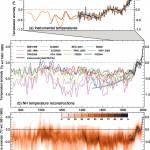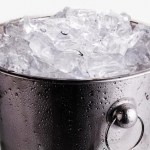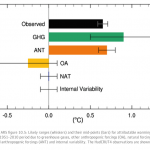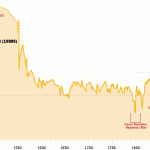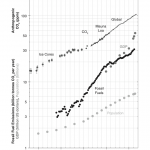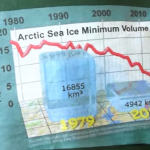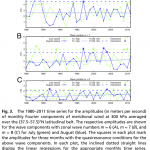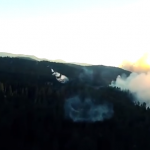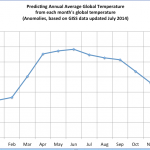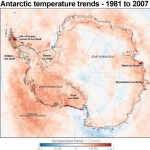global warming
Who is Steve McIntyre? From DeSmogBlog.com:
Stephen McIntyre has been a long-time mining industry executive, mostly working on the “stock market side” of mining exploration deals. He published a blog called Climate Audit where he attempts to analyse in sometimes long and extensive detail the work of climate change scientists where he documents “statistical mistakes” in peer-reviewed scientific literature. ...
McIntyre has been described as a “persistent amateur who had no credentials in applied science before stepping into the global warming debate in 2003” and has been a prominent critic of…
Not really a fully fledged blog post, just a quick link pointing you to something interesting.
More than 100%? Sounds funny, doesn't it? Let me rephrase. Humans have caused so much climate change that some of the climate change changed some of the climate back.
Still sounds kinda funny.
OK, try again: Humans have caused a whole bunch of global warming. Nature has caused a small amount of global cooling, which has offset a little of the human caused global warming. But also, humans have caused a little bit of global cooling as well.
Make sense? OK, look at this graph:
I'm sure you've…
In a recent Wall Street Journal article, Steven Koonin, former Department of Energy Undersecretary and BP scientist makes the case that global warming is caused by humans, important, that we must do something about it, and that further research on key topics is necessary to help guide policy.
He states,
The crucial scientific question for policy isn’t whether the climate is changing. That is a settled matter … We know, for instance, that during the 20th century the Earth’s global average surface temperature rose 1.4 degrees Fahrenheit.
Nor is the crucial question whether humans are…
Yes, yes, we hear it all the time: More CO2 is good because plants love CO2
That is a rather dumb thing to say for a number of reasons; nature is not simple. You don't change one variable and expect other variables to respond as though we were turning a garden hose up or down. For example, while plant growth might be enhanced with more CO2 in the atmosphere, there is no reason to think this would be linear, or similar across all plants. You have to dance with the one who brung ya. The plants we have are the plants that have been under Darwinian selection optimizing growth and maintenance…
According to data just updated by NASA, last August was the warmest August for the entire instrumental data record, which begins in 1881. This has been something of a mixed year but overall warm. Of the 134 years for which there are data, the coolest month this year so far was February, at 17th place, with July also being cool, at 11th place. Keep in mind this is over 134 years. For the months of January through August, there are no one-digit ranks (1 through 8) prior to 1989, inclusively, and you don't really start getting consistent "top ten" ranks until 1998.
Monthly ranks so far this…
Did you ever read a textbook on economic history, or an in-depth article on the relative value of goods over the centuries expressed in current US dollars? Have you ever encountered a graphic that shows long term trends in rainfall patterns or other climate variables, using a couple of simple lines, designed to give a general idea of relative conditions during different eras? Here are a few examples of what I'm talking about.
This is a graphic made by a major investment firm culling information from dozens or perhaps hundreds of sources into a single graphic. This is the graphic as it was…
Climate Smart & Energy Wise: Advancing Science Literacy, Knowledge, and Know-How by Mark McCaffrey is a book written primarily for teachers, to give them the information and tools they need to bring the topic of climate change effectively to their classrooms. It addresses the Climate Literacy and Energy Literacy frameworks, designed to guide teaching this important topic.
The book provides basics on climate and energy, approaches to teaching about climate and energy, and of special interest for teachers, syncing the topics with existing standards. The main point of the book is to get…
Climate change is emotional, especially when the effects are disastrous and people's lives are ruined. It is vague, sometimes. For example, bad weather happens and always has happened, so an increase in frequency or severity of bad weather isn't necessarily qualitatively novel, and can be hard to put one's finger on. Although the negative effects of climate change are already here, more serious effects are in our future. So, climate change has a component that is mysterious and hard to relate to, because it is in the future. Climate change is global, but spotty on a given day or in a given…
This is a big thing. Starting just now, 97 different top experts on climate change, starting with Michael Mann (author of this book), one per hour, will have a say about the consensus. This is being run by Skeptical Science.
From Dana Nuccitelli's post at The Guardian,
Research has shown that when people are aware of the expert consensus, they’re more likely to accept the fact that humans are causing global warming, and also more likely to support taking action to address the problem. Hence the consensus gap is a significant roadblock preventing us from tackling global warming.
To help…
This is Andy Robinson of the Sea Ice Graphics
Put up or ... dump water on your head!
This is not a peer reviewed meta-study, but a meta-study nonetheless. Reuters has engaged in a major journalistic effort to examine sea level rise and has released the first part (two parts, actually). It is pretty good; I only found one paragraph to object to, and I'll ignore that right now.
There are two reasons this report is important. First, it documents something about sea level rise that I've been trying to impress on people all along. The effects of sea level rise do not end at one's perceived position of a new shoreline. Here's what I mean.
Suppose you are standing on a barrier…
The climate change documentary, "Years of Living Dangerously" was nominated for two Emmy Awards. That was well deserved and fantastic news. But, frankly, with Cosmos also nominated for the same categories, no one really expected more than the nomination.
But, while Cosmos dis win in the "Outstanding Writing For Nonfiction Programming" category, and good on them for doing that, "Years of Living Dangerously" took the award for "Outstanding Documentary or NonFiction Series.
This is of course because it is a great, well done documentary. But I like to think part of this outcome has to do with…
A new paper advances our understanding of the link between anthropogenic global warming and the apparent uptick in severe weather events we’ve been experiencing. Let’s have a look at the phenomenon and the new research.
Climate Change: The Good, The Bad, and the Ugly.
It is mostly bad. Sometimes it is ugly. I was looking at crop reports from the USDA and noticed an interesting phenomenon in Minnesota, that is repeated across much of the US this year: Fewer acres are in crops but among those acres that are planted there is a high expected per-acre yield. The higher yield will make up for the…
Lots to talk about here:
Published on Aug 1, 2014
Arctic Emergency: Scientists Speak On Melting Ice and Global Impacts (1080p HD)
This film brings you the voices of climate scientists - in their own words.
Rising temperatures in the Arctic are contributing the melting sea ice, thawing permafrost, and destabilization of a system that has been called "Earth's Air Conditioner".
Global warming is here and is impacting weather patterns, natural systems, and human life around the world - and the Arctic is central to these impacts.
-------------------------------------------------
Scientists…
I don't like the messaging Holdren almost always seems to start with: "While we can't attribute a single bla bla bla to climate change" (it is not the right way to phrase what is happening, this is a good video just out:
So, you accept the science of climate change and global warming as legit. But you often encounter people, at family gatherings, on your Facebook page, on Twitter, at social events, etc. who don't. Do you keep your mouth shut when someone says something clearly wrong that brings the science into question illegitimately? If you do, and others are listening, then one voice, a denialist voice, is influencing people. Probably better to say something.
The problems is that the denialist schtick involves having a lot of different arguments, with absolutely no regard as to legimacy, against the…
The original hoser, I'm told by an unimpeachable source from way up in Canada, was the guy who went out to his front yard in the middle of the winter and hosed down the lawn in order to make some flat ice, so he and his friends could play hockey. A better way to get ice is to find a cove or embayment along a small lake that is protected from the wind; clear off the snow and you've got a nice flat surface. If that is not available, clear the snow off the rugged and rough ice that forms on many lakes, build a dam of hard packed snow around it ... and hose that down. Even better, build a…
We just experienced the warmest two months (May and June) on record, meaning, essentially, in well over 100 years. This is because of anthropogenic global warming (AGW). Does this mean that 2014 will be the warmest year on record? Probably not, in part because February was pretty cold and that lowers the score for the year. But it will be a warm year.
There is a strong correlation between the temperature in June and what turns out to be the global mean for the year. This can be shown empirically by calculating a simple correlation coefficient for each month of the year and the year's…
One of the things climate change science deniers say, to throw you off, is that Antarctic sea ice is expanding. They even claim that the amount of expansion of Antarctic sea ice offsets the dramatic retreat of Arctic sea ice (see this for the latest on the Arctic). I've even seen it argued, in that famous peer-reviewed publication Twitter, that there is an inter-polar teleconnection that guarnatees that when the ice on one end of the earth expands the ice on the other end of the earth contracts, and visa versa, so everything is fine.
That Antarctic Sea ice is expanding has become standard…
